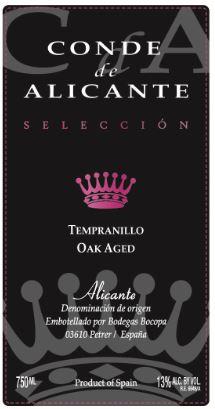2012 Alicante Tempranillo
The Conde De Alicante Barrique, a stunning example of Tempranillo from the picturesque Alicante region, offers an impressive wine experience. Its deep red hue entices the eye, while aromas of ripe blackberries and cherries, complemented by hints of vanilla and spice from oak aging, create an enticing bouquet. On the palate, this wine showcases a full-bodied structure, with a balanced acidity that adds freshness to its rich fruit flavors. The tannins are notable yet smooth, providing a framework that enhances its aging potential. The Conde De Alicante Barrique is a dry wine that leaves a lasting impression, ideal for pairing with hearty dishes or savoring on its own. This 2012 vintage reflects the unique terroir of Alicante, making it a remarkable choice for any wine enthusiast.
The Conde De Alicante Barrique, a stunning example of Tempranillo from the picturesque Alicante region, offers an impressive wine experience. Its deep red hue entices the eye, while aromas of ripe blackberries and cherries, complemented by hints of vanilla and spice from oak aging, create an enticing bouquet. On the palate, this wine showcases a full-bodied structure, with a balanced acidity that adds freshness to its rich fruit flavors. The tannins are notable yet smooth, providing a framework that enhances its aging potential. The Conde De Alicante Barrique is a dry wine that leaves a lasting impression, ideal for pairing with hearty dishes or savoring on its own. This 2012 vintage reflects the unique terroir of Alicante, making it a remarkable choice for any wine enthusiast.




